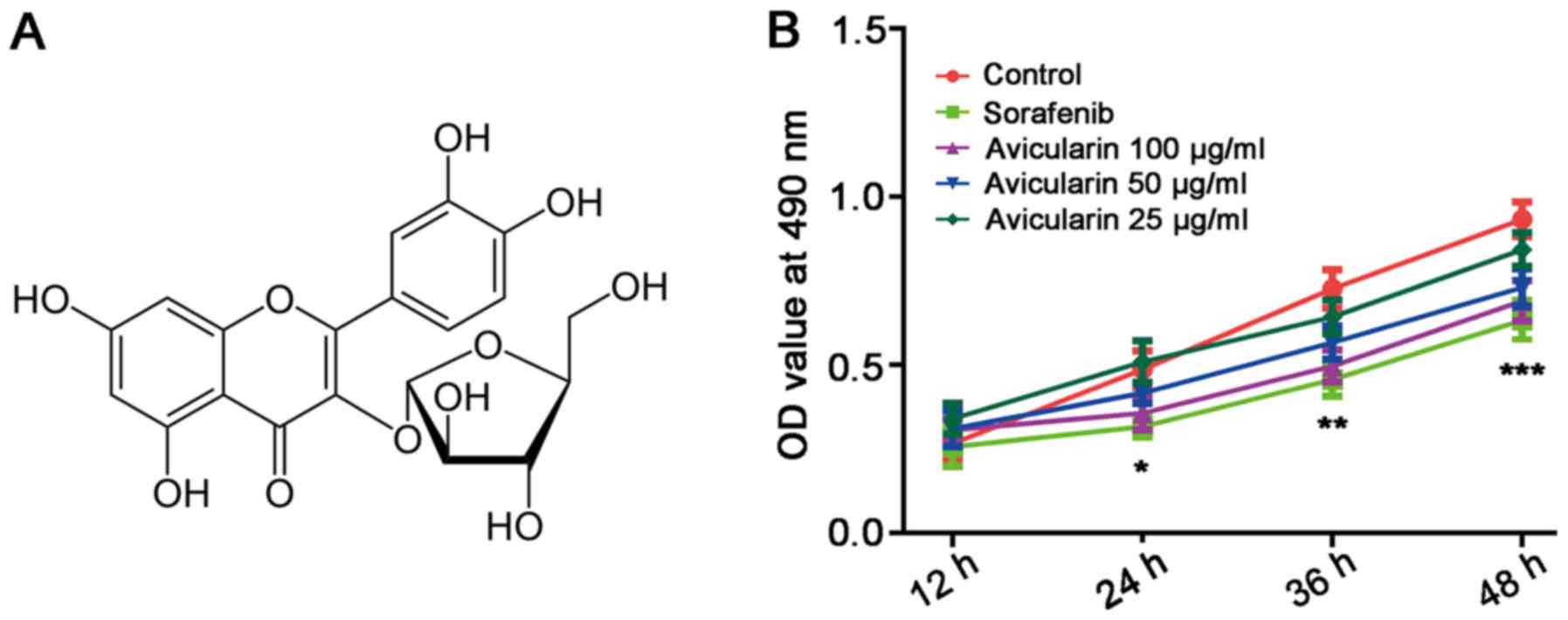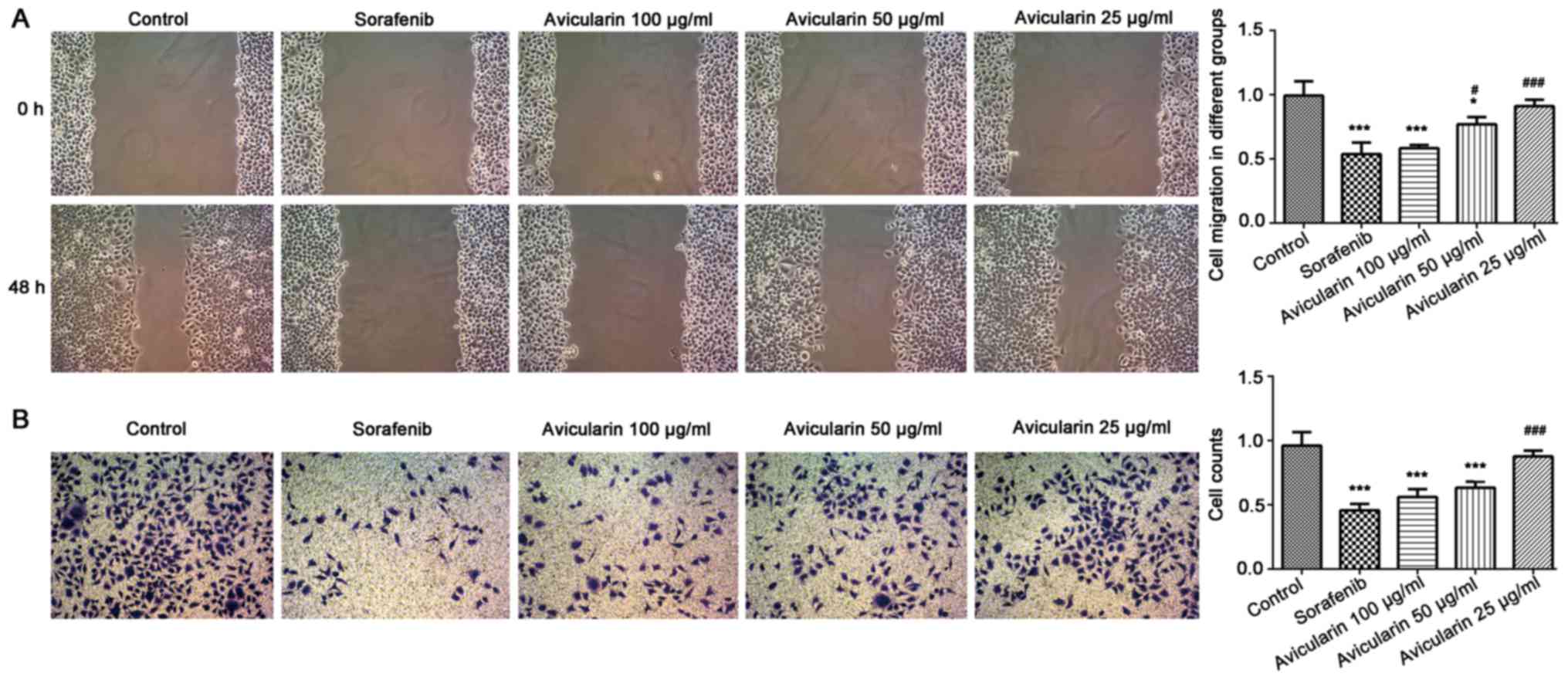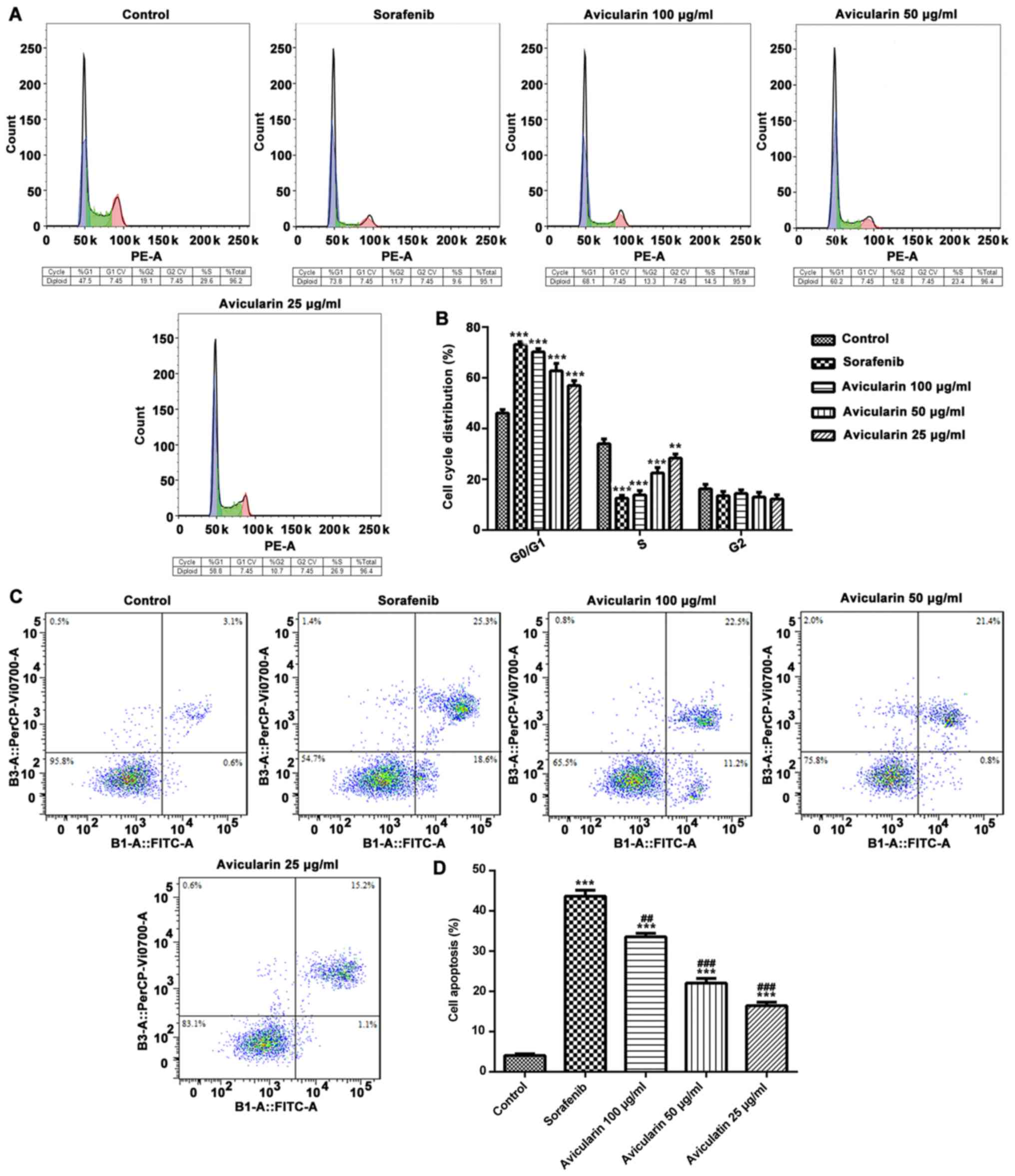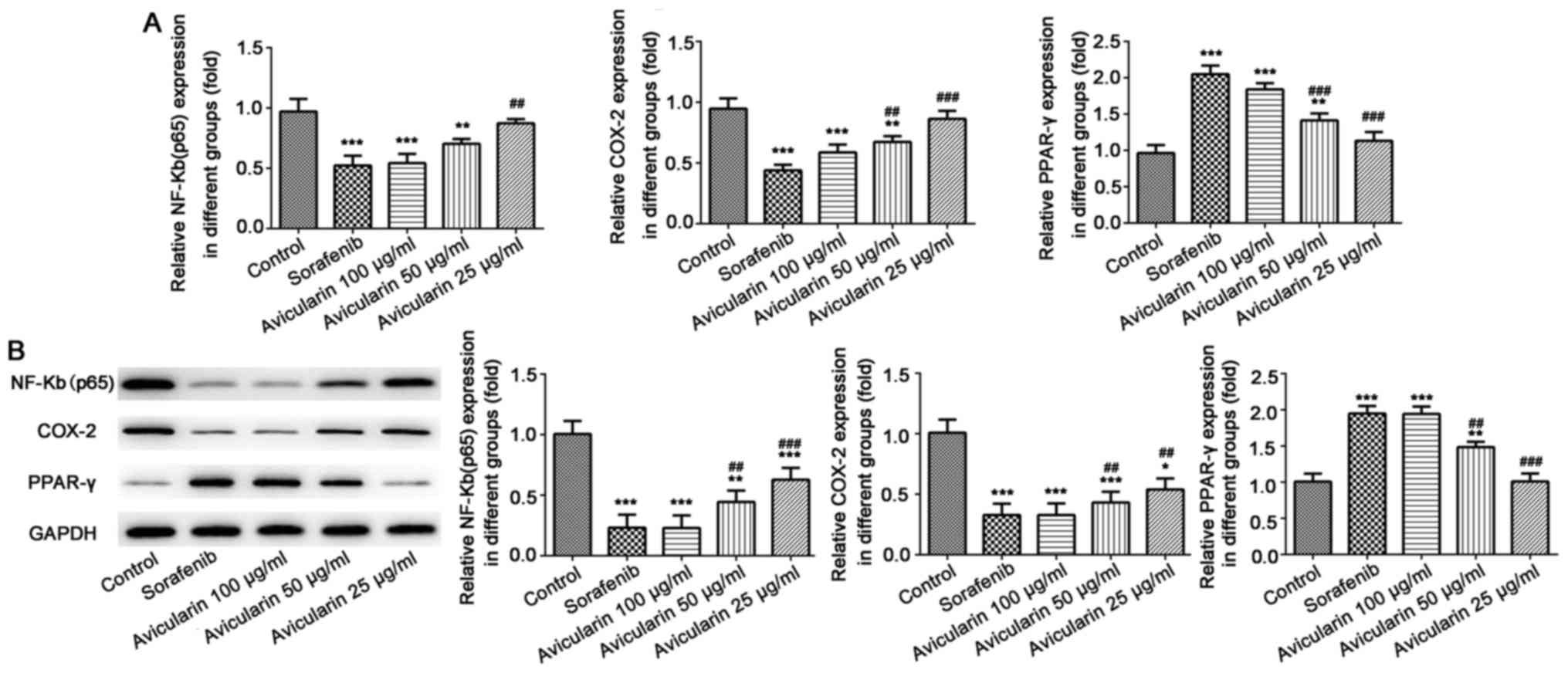|
1
|
Lu T, Seto WK, Zhu RX, Lai CL and Yuen MF:
Prevention of hepatocellular carcinoma in chronic viral hepatitis B
and C infection. World J Gastroenterol. 19:8887–8894. 2003.
View Article : Google Scholar
|
|
2
|
Torre LA, Bray F, Siegel RL, Ferlay J,
Lortet-Tieulent J and Jemal A: Global cancer statistics, 2012. CA
Cancer J Clin. 65:87–108. 2015. View Article : Google Scholar : PubMed/NCBI
|
|
3
|
El-Serag HB and Rudolph KL: Hepatocellular
carcinoma: Epidemiology and molecular carcinogenesis.
Gastroenterology. 132:2557–2576. 2007. View Article : Google Scholar : PubMed/NCBI
|
|
4
|
Yang JD and Roberts LR: Hepatocellular
carcinoma: A global view. Nat Rev Gastroenterol Hepatol. 7:448–458.
2010. View Article : Google Scholar : PubMed/NCBI
|
|
5
|
Jiang X, Feng K, Zhang Y, Li Z, Zhou F,
Dou H and Wang T: Sorafenib and DE605, a novel c-Met inhibitor,
synergistically suppress hepatocellular carcinoma. Oncotarget.
6:12340–12356. 2015.PubMed/NCBI
|
|
6
|
Cui X, Wang Y, Kokudo N, Fang D and Tang
W: Traditional Chinese medicine and related active compounds
against hepatitis B virus infection. Biosci Trends. 4:39–47.
2010.PubMed/NCBI
|
|
7
|
Williams RJ, Spencer JP and Rice-Evans C:
Flavonoids: Antioxidants or signalling molecules? Free Radic Biol
Med. 36:838–849. 2004. View Article : Google Scholar : PubMed/NCBI
|
|
8
|
Handoussa H, Osmanova N, Ayoub N and
Mahran L: Spicatic acid: A 4-carboxygentisic acid from Gentiana
spicata extract with potential hepatoprotective activity. Drug
Discov Ther. 3:278–286. 2009.PubMed/NCBI
|
|
9
|
Fujimori K and Shibano M: Avicularin, a
plant flavonoid, suppresses lipid accumulation through repression
of C/EBPα-activated GLUT4-mediated glucose uptake in 3T3-L1 cells.
J Agric Food Chem. 61:5139–5147. 2013. View Article : Google Scholar : PubMed/NCBI
|
|
10
|
Vo VA, Lee JW, Chang JE, Kim JY, Kim NH,
Lee HJ, Kim SS, Chun W and Kwon YS: Avicularin inhibits
lipopolysaccharide-induced inflammatory response by suppressing ERK
phosphorylation in RAW 264.7 macrophages. Biomol Ther (Seoul).
20:532–537. 2012. View Article : Google Scholar : PubMed/NCBI
|
|
11
|
Guo XF, Liu JP, Ma SQ, Zhang P and Sun WD:
Avicularin reversed multidrug-resistance in human gastric cancer
through enhancing Bax and BOK expressions. Biomed Pharmacother.
103:67–74. 2018. View Article : Google Scholar : PubMed/NCBI
|
|
12
|
Srivastava S, Somasagara RR, Hegde M,
Nishana M, Tadi SK, Srivastava M, Choudhary B and Raghavan SC:
Quercetin, a natural flavonoid interacts with DNA, Arrests cell
cycle and causes tumor regression by activating mitochondrial
pathway of apoptosis. Sci Rep. 6:240492016. View Article : Google Scholar : PubMed/NCBI
|
|
13
|
Livak KJ and Schmittgen TD: Analysis of
relative gene expression data using real-time quantitative PCR and
the 2(-Delta Delta C(T)) method. Methods. 25:402–408. 2001.
View Article : Google Scholar : PubMed/NCBI
|
|
14
|
Lang L: FDA approves sorafenib for
patients with inoperable liver cancer. Gastroenterology.
134:3792008. View Article : Google Scholar
|
|
15
|
Hahn O and Stadler W: Sorafenib. Curr Opin
Oncol. 18:615–621. 2006. View Article : Google Scholar : PubMed/NCBI
|
|
16
|
Echeverria V, Burgess S, Gamble-George J,
Zeitlin R, Lin X, Cao C and Arendash GW: Sorafenib inhibits nuclear
factor kappa B, decreases inducible nitric oxide synthase and
cyclooxygenase-2 expression, and restores working memory in APPswe
mice. Neuroscience. 162:1220–1231. 2009. View Article : Google Scholar : PubMed/NCBI
|
|
17
|
Nijveldt RJ, van Nood E, van Hoorn DE,
Boelens PG, van Norren K and van Leeuwen PA: Flavonoids: A review
of probable mechanisms of action and potential applications. Am J
Clin Nutr. 74:418–425. 2001. View Article : Google Scholar : PubMed/NCBI
|
|
18
|
Chen CH, Huang TS, Wong CH, Hong CL, Tsai
YH, Liang CC, Lu FJ and Chang WH: Synergistic anti-cancer effect of
baicalein and silymarin on human hepatoma HepG2 cells. Food Chem
Toxicol. 47:638–644. 2009. View Article : Google Scholar : PubMed/NCBI
|
|
19
|
Liu B and Yu S: Amentoflavone suppresses
hepatocellular carcinoma by repressing hexokinase 2 expression
through inhibiting JAK2/STAT3 signaling. Biomed Pharmacother.
107:243–253. 2018. View Article : Google Scholar : PubMed/NCBI
|
|
20
|
Liang RR, Zhang S, Qi JA, Wang ZD, Li J,
Liu PJ, Huang C, Le XF, Yang J and Li ZF: Preferential inhibition
of hepatocellular carcinoma by the flavonoid Baicalein through
blocking MEK-ERK signaling. Int J Oncol. 41:969–978. 2012.
View Article : Google Scholar : PubMed/NCBI
|
|
21
|
Jiang CP, Ding H, Shi DH, Wang YR, Li EG
and Wu JH: Pro-apoptotic effects of tectorigenin on human
hepatocellular carcinoma HepG2 cells. World J Gastroenterol.
18:1753–1764. 2012. View Article : Google Scholar : PubMed/NCBI
|
|
22
|
Garcia ER, Gutierrez EA, de Melo FCSA,
Novaes RD and Goncalves RV: Flavonoids effects on hepatocellular
carcinoma in murine models: A systematic review. Evid Based
Complement Alternat Med. 2018:63289702018. View Article : Google Scholar : PubMed/NCBI
|
|
23
|
Gilmore TD: Introduction to NF-kappaB:
Players, pathways, perspectives. Oncogene. 25:6680–6684. 2006.
View Article : Google Scholar : PubMed/NCBI
|
|
24
|
Kim JH, Na HK, Pak YK, Lee YS, Lee SJ,
Moon A and Surh YJ: Roles of ERK and p38 mitogen-activated protein
kinases in phorbol ester-induced NF-kappaB activation and COX-2
expression in human breast epithelial cells. Chem Biol Interact.
171:133–141. 2008. View Article : Google Scholar : PubMed/NCBI
|
|
25
|
Koeffler HP: Peroxisome
proliferator-activated receptor gamma and cancers. Clin Cancer Res.
9:1–9. 2003.PubMed/NCBI
|
|
26
|
Vara D, Morell C, Rodriguez-Henche N and
Diaz-Laviada I: Involvement of PPARgamma in the antitumoral action
of cannabinoids on hepatocellular carcinoma. Cell Death Dis.
4:e6182013. View Article : Google Scholar : PubMed/NCBI
|
|
27
|
Li S, Li J, Fei BY, Shao D, Pan Y, Mo ZH,
Sun BZ, Zhang D, Zheng X, Zhang M, et al: MiR-27a promotes
hepatocellular carcinoma cell proliferation through suppression of
its target gene peroxisome proliferator-activated receptor γ. Chin
Med J (Engl). 128:941–947. 2015. View Article : Google Scholar : PubMed/NCBI
|
|
28
|
Galli A, Ceni E, Mello T, Polvani S,
Tarocchi M, Buccoliero F, Lisi F, Cioni L, Ottanelli B, Foresta V,
et al: Thiazolidinediones inhibit hepatocarcinogenesis in hepatitis
B virus-transgenic mice by peroxisome proliferator-activated
receptor gamma-independent regulation of nucleophosmin. Hepatology.
52:493–505. 2010. View Article : Google Scholar : PubMed/NCBI
|
|
29
|
Yu J, Shen B, Chu ES, Teoh N, Cheung KF,
Wu CW, Wang S, Lam CN, Feng H, Zhao J, et al: Inhibitory role of
peroxisome proliferator-activated receptor gamma in
hepatocarcinogenesis in mice and in vitro. Hepatology.
51:2008–2019. 2010. View Article : Google Scholar : PubMed/NCBI
|


















